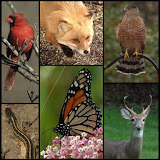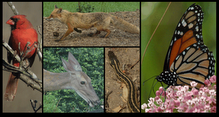 A quick summary of previous posts about foxes in the Colvin Run Habitat and about mange illness in foxes. There many postings about Red-tailed Foxes visiting the Habitat, but only three postings about foxes infected with mange. I am posting this update to make sure that all information we know is easily found in this blog.
A quick summary of previous posts about foxes in the Colvin Run Habitat and about mange illness in foxes. There many postings about Red-tailed Foxes visiting the Habitat, but only three postings about foxes infected with mange. I am posting this update to make sure that all information we know is easily found in this blog.
First and foremost, regardless of how cute they are, foxes are wild animals. Kids - talk to your parents. Parents - make sure you use good judgment and appropriate caution.
Fact and Fiction about Foxes with Mange:
>It is very common for individuals to believe that if they see a fox near their homes, looking or acting sick, that it must have rabies. 99% of the time this is not the case.
>The animal most likely is suffering from mange; a debilitating condition that causes severe scratching, open sores and loss of hair. >The good news is that it is easily treatable.
Information to help you understand an animal with mange:
>A fox with mange is very weak from an inability to hunt for food.
>They are tired and suffering from constant itching and burning sensations.
>Because they must eat they will venture close to homes looking for food. Pet food that is left outside is a frequent choice.
>The fox will not attack cats, dogs or children. Even under normal circumstances it is not aggressive. It will react however, if trying to be captured.
>They do not want to take up residence in your area permanently. If treated and allowed to recover they will move on.
However, mange, like many illness, needs to be treated with medication:
>See this site from upstate New York for details
>Mange in foxes is treatable with Ivermectin which is inexpensive and easy to obtain.
I am hoping that the recent anonymous commenter from Great Falls, Viriginia (a community adjacent to the Colvin Run Habitat), will continue to keep us up to date on the progress of treating his foxes.
If you have observations of foxes with mange and especially if you are able to treat mangy foxes with Ivermectin, I hope that you will post a comment and let us know your actual experiences and results.
In the meantime, 9 months have passed since we have observed a fox in the Habitat. But hope springs eternal, and we continue to wait for another blessing of foxes.

 A pair of red-shouldered hawks arrived was observed early this morning. As red-shouldered hawks are known to return to a given locale for many years, I would like to think that today's pair is the pair observed on three occasions in 2007 (1, 2, 3).
A pair of red-shouldered hawks arrived was observed early this morning. As red-shouldered hawks are known to return to a given locale for many years, I would like to think that today's pair is the pair observed on three occasions in 2007 (1, 2, 3). Later in the afternoon, a single hawk was observed on two occasions - or was it on observation of each of the two hawks.
Later in the afternoon, a single hawk was observed on two occasions - or was it on observation of each of the two hawks. I managed to catch one of the red-shoulders in flight also.
I managed to catch one of the red-shoulders in flight also.











